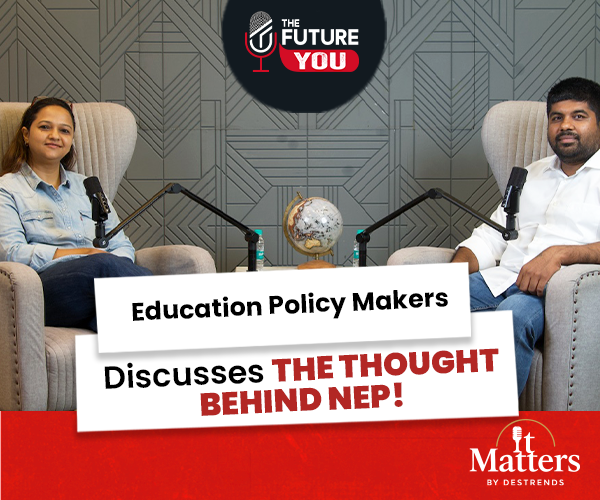Have a Question? Let’s Talk!
Got something on your mind? Drop your question below — our team is here to help and will connect with you shortly.
Follow Us On
EPISODE 4 : Education Policy Makers Speak Discuss the thoughts behind NEP

Whenever education leaders come forward to propose reforms, words like inclusivity, flexibility, and preparing students for the future are often mentioned. Yet, the more rigorous challenge is to instill those ideals into schools and everyday student life. Rahul Singhi, the Co-Founder of Poornima University, is among those at the forefront of this battle: he has been striving to put into effect frameworks like the National Education Policy in everyday realities. His leadership is an example of translating a policy vision into a daily reality for thousands of students.
Putting Students in the Center of the Learning Process
This is one of the very strong concepts touched on by recent reforms. The student-centric approach has been implemented throughout programs at Poornima University under the stewardship of Rahul Singhi.
Faculty act as mentors rather than instructors, encouraging exploration and inquiry.
Student-Centric Learning means that learners move at their own pace with mentorship and projects.
Collaborative analyses are the primary content of experiential learning activities based on the 21st Century Learning Model, where adaptability, creativity, and teamwork are just as important as subject matter expertise.
Students participate in directing their learning path and are therefore no longer mere recipients. This mirrors what education leaders envision for India’s future-ready digital classrooms: interactive, accessible, and skill-oriented knowledge landscapes.
Building Character Alongside Knowledge
The reform discussions really stress that education is about character-building in addition to building the intellect. This, however, remains a vision at Poornima University through Value-Based Schooling, where students are led to develop empathy, integrity, and responsibility along with technical learning.
Through workshops, community-building, and reflective activities, Emotional Intelligence in Education is implemented in order to build graduates who are employable, socially responsible, and emotionally intelligent.
Education rooted in Indian Philosophy (with principles such as mindfulness, discipline, and collective responsibility) is embedded in campus life. Advanced tools—an AI-enabled platform, world-class digital classrooms, and research-oriented pedagogy—prepare students for global competitiveness. This dual concept pays homage to the Indian ethos while catering to contemporary needs.
NEP at Work: From the Universities
The nep 2020 laid down a vision of inclusivity, flexibility, and multidisciplinarity. These objectives are concretely reflected in the vision of Poornima University under the stewardship of Rahul Singhi:
- A flexible credit-based academic structure where a student can customize his academic journey.
- Multidisciplinary options that increase exposure without putting an economic burden on students.
- A strong emphasis on ranking and accreditation to give a global dimension while ensuring affordability.
- Sustainable and ethical learning encourages social responsibility and green campus activities.
Such integration establishes how reforms like NEP can evolve beyond policy documents into real student outcomes, benefiting every learner.
Shaping the Future of Higher Education
It is in these terms that a policy gets judged—successful leadership must translate policy into implementation. Poornima University hence stands as an example of transforming higher education through strong leadership. Students graduate with degrees and, at the same time, receive training in critical thinking, adaptability, and values.
This is particularly consequential, as employability today hinges on the intersection between technical expertise and human skills. Poornima University combines tradition and modernization to prepare students to succeed in both local and global environments.
From Words in Policies to Concrete Results
When policymakers speak, their words inspire change. But it is leaders like Rahul Singhi who ensure those words take form in classrooms and student experiences. At Poornima University, reforms are not abstract—they are lived through student-centric teaching, value-driven initiatives, and future-focused programs.
And the very existence of this blog itself stands as a testimony to a blog on education that maps the way national visions translate into educational realities. Through that bridge connecting policy with practice, institutions like Poornima ensure that students are more than equipped—they are primed to lead in a changing world.